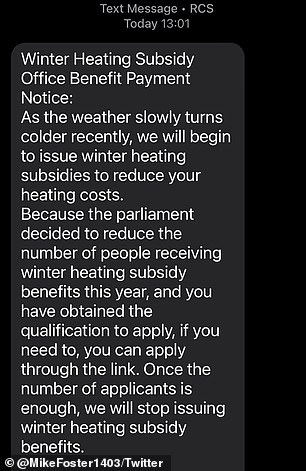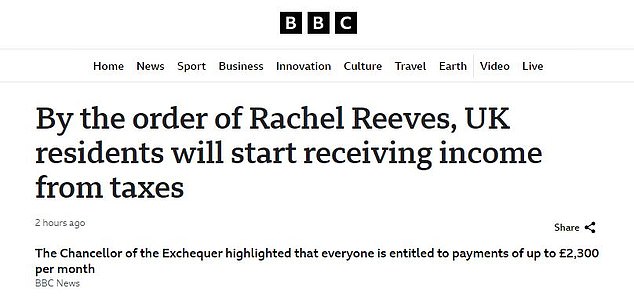Table of Contents
Scammers are taking advantage of new rules set out by the Budget to trap victims, according to posts and messages seen by This is Money.
Criminals have targeted people through fake messages and websites offering them a “winter heating allowance” or a tax refund.
The messages claim to come from official sources such as His Majesty’s Revenue and Customs, and direct them through a link to another website where they are asked to pay money or enter personal information.
Many mention Rachel Reeves and the Budget, hoping to tap into people’s concerns about how the ads could affect their finances.
Cashing in: Fraudsters are taking advantage of Labour’s autumn budget to scam vulnerable victims
In many cases, scammers resort to email and text message scams, known as phishing and smishing, where they send messages claiming to be from government departments such as HMRC.
In examples of these scams posted on social media, scammers offered winter heating subsidies and living expenses subsidies.
One text message scam said: “Once the number of applicants is sufficient, we will stop providing winter heating subsidy benefits” and asked victims to click a link to register for the free payments.
These scammers seek to gain access to victims’ banking details or personal information.
Worryingly, scammers are increasingly replicating legitimate websites to make their scams more credible and less likely to be detected.

Smishing scam: Scammers offer false winter heating subsidies
An example disguised as a BBC News article promoted a £2,300-a-month ‘welfare scheme’ that required an initial deposit of £200 to start receiving payments.
One line in the mock story read: ‘According to Chancellor of the Exchequer Rachel Reeves, around 800 places remain free on the platform.
“Even if you have not yet decided whether you would like to receive compensation from the State in the amount of £2,300 per month, we strongly recommend that you complete the registration form to reserve an account.”
Lauren Hendry Parsons, privacy advocate at privacy software company ExpressVPN, said: “Unfortunately, scams like these are increasing in frequency and sophistication, especially around events like The Budget.”
‘National events with a high media profile and significant social media commentary around them are an opportunity for scammers to exploit people’s worries and concerns.
“Scammers will take advantage of the complexity of financial changes to take advantage of people’s desire to avoid potential losses or boost investments.”
Another showed a fake quote from LBC host Iain Dale: ‘Iain Dale: ‘I have no doubt this is legal, our lawyers have checked everything. So does this mean that any citizen over the age of 35 can invest £200 in this project and receive £2,300 from the State on a regular basis?
Scammers use these simulated websites to pass off their scams as genuine opportunities to prey on the vulnerable and desperate.

Trick: Scammers replicate legitimate websites like the BBC to trick victims into revealing their financial information.
Another scam seen by This is Money showed a mockup of the government website, Gov.UK, asking users to enter their full name, number and address, as well as their email address and debit card details or credit to be eligible. for a payment of £900.
Hendry Parsons said: “Fake ads and deepfake images and videos have increased dramatically thanks to the latest advances in artificial intelligence tools, along with their widespread accessibility. Now, anyone can create fake images, videos and ads that are almost indistinguishable. of the genuine ones.
It is crucial that people exercise caution before acting on any advertisement promising to halve their tax bill or double their investments.
‘This technological leap has significantly lowered the barrier for scammers, allowing them to craft convincing fake news-style articles, often claiming to offer advice on how to reduce tax bills or boost investments. But in reality, these are schemes designed to steal your hard-earned money.
He added: ‘With this in mind, it is vital that people exercise caution before acting on any advert promising to halve their tax bill or double their investments.
‘The old saying is true: if something seems too good to be true, it probably is.
“To check the legitimacy of an announcement relating to a specific announcement in the Budget, you should check whether the information is available on an official government website (ending in .gov.uk) or a trusted and well-known media source” .
SAVE MONEY, MAKE MONEY

3.75% APR Var.

3.75% APR Var.
Chase checking account required*
4.91% 6 month solution
4.91% 6 month solution
Increase in interest rates at GB Bank

free stock offer

free stock offer
No account fee and free stock trading

4.84% cash Isa

4.84% cash Isa
Flexible Isa now accepting transfers

Trading Fee Refund

Trading Fee Refund
Get £200 back in trading fees
Affiliate links: If you purchase a This is Money product you may earn a commission. These offers are chosen by our editorial team as we think they are worth highlighting. This does not affect our editorial independence. *Chase: 3.69% gross. T&Cs apply. 18+, UK residents
Some links in this article may be affiliate links. If you click on them, we may earn a small commission. That helps us fund This Is Money and keep it free to use. We do not write articles to promote products. We do not allow any commercial relationship to affect our editorial independence.



